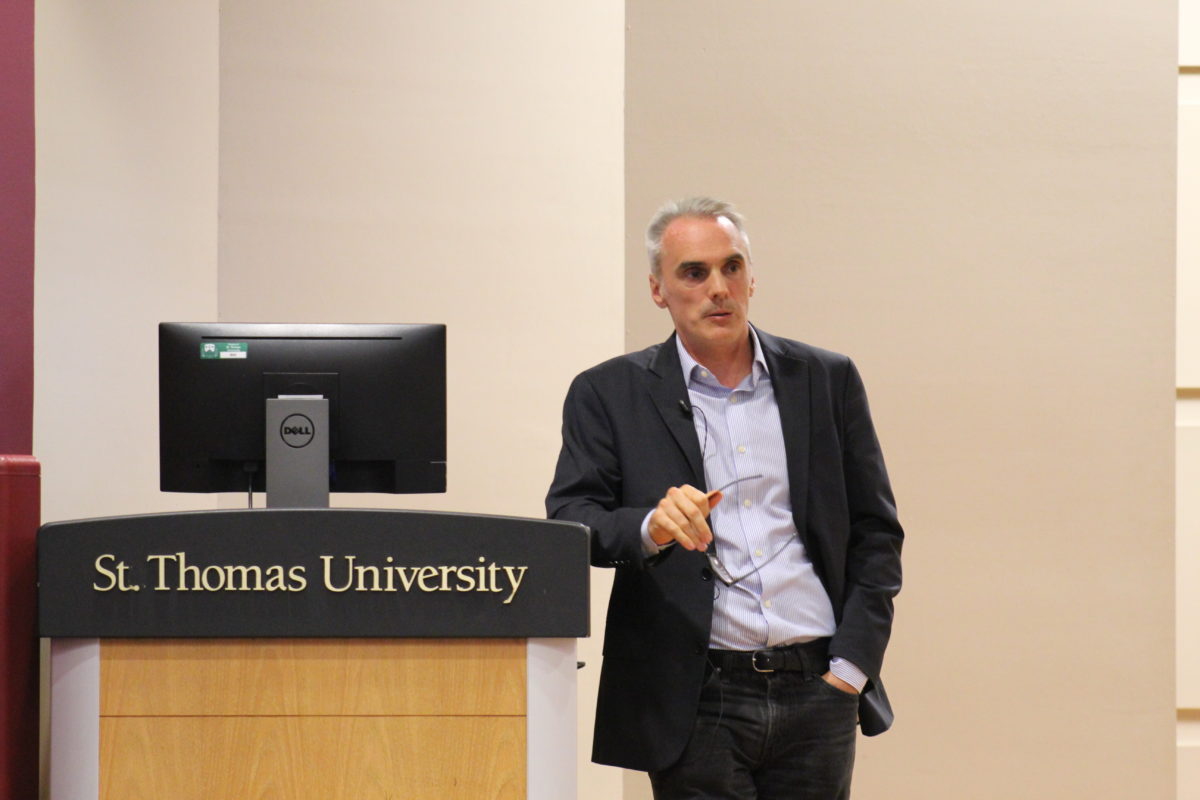Journalist Bruce Livesey was blunt in his assessment of the relationship between Canada’s fifth wealthiest family and New Brunswick.
“Based on what I’ve seen, the Irvings do abuse the people of the province,” he said.
Livesey, an investigative reporter for the National Observer, came to St. Thomas University on Sept. 21 to talk about his six-part “House of Irving” series, which examines the powerful role of the Irving family in New Brunswick.
His public talk at Kinsella Auditorium was part of the NB Media Co-op’s annual general meeting.
“You could say it’s been a stroke of genius by the Irving’s,” Livesey told the crowd. “They become one of the richest families in Canada at the expense of New Brunswick and its taxpayers, yet they sort of hoodwink everyone to think that they’re doing a public good.”
Livesey began by pointing out the economic situation in Saint John – where the Irving Oil is headquartered. The city has one of the highest child poverty rates in the country at 30 per cent, and a declining population. Saint John, which Livesey describes as a “ghost town,” was surpassed by Moncton in 2016 as the most populous city in the province.
The Conservation Council of New Brunswick released a study in 2009 that showed the rates of lung cancer in Saint John to be 40 to 50 per cent higher than in Fredericton and Moncton, which Livesey attributes to air pollution from the Irving refinery.
Livesey also called attention to significant tax breaks for the Irvings, at a time when Saint John is facing serious debt and financial struggles. He said that an Irving Oil rail terminal was paying $20,000 a year in taxes, while the Tim Horton’s across the street was paying $37,000.
Despite those issues, Livesey said he has the impression that most residents view the family in positive light.
“One phrase that you often hear is ‘Thank god for the Irvings; if it wasn’t for the Irvings we’d be so much worse off.’”
“In my view it’s sort of akin to the Stockholm syndrome,” he said, referring to a condition where a hostage develops positive feelings toward their captor as a means of survival.
Livesey said the province would be in better shape than its Maritime neighbours if the arguments he heard in support of the Irvings were true.
Current estimates show that the Irvings own between 174 and 250 companies estimated at a value of $10 billion, and are responsible for one of every 10 jobs in New Brunswick, and more than half of the province’s exports, Livesey said.
Livesey said it was challenging to get anyone to talk to him for his stories. Former premiers and cabinet members, academics and Irving company officials never responded or declined to comment.
The people he managed to talk to had a sense of anxiety when discussing the Irvings.
“This fear factor of getting people to talk was extremely prevalent,” he said.
Livesey said he reached out to a professor at STU for an interview on the subject, and she wrote back and said she would be “too afraid” to.
Beyond the Irving’s grip of the oil, lumber, shipping, retail and transportation industries, the family is also in control of New Brunswick’s media, owning its three English-language daily newspapers, 18 of the province’s English and French weeklies, and three radio stations.
“One of the distressing things it’s that often it’s media outside New Brunswick that ends up writing about the Irvings,” Livesey said.
Livesey sees a political solution as the only challenging path that could lead to change.
“In a kind of terrible way New Brunswick is what happens when you don’t break up monopolies or large corporations,” he said.

